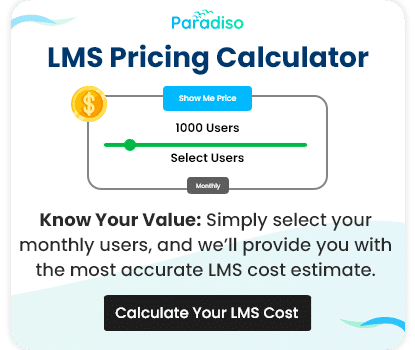-
Vague knowledge of audiences’ need
In some cases, training providers are unsure of their clients’ needs. They do some market research, but not enough to justify an LMS purchase. So, they don’t know what to look for, how much support they need, or how to deploy. As a result, they go over budget because they have to improve the tool’s functionality.
-
Lack of a Must-Have Feature List
As a training company, you must consider your own needs and those of your clients. For example, you serve more giant corporations that require global compliance training. An LMS with certification management, multilingual support, and advanced reporting may be required. Even if you do their updates and maintenance, they need these features to maximize their ROI.
-
Underestimating Vendor Support
Even seasoned trainers need help now and then. So do their clients. To avoid budgeting errors, you should never underestimate the value of an LMS for training companies with advanced vendor support. For example, a system with limited functionality, like FAQ, may be cheaper now. But what if you have a severe issue a month from now and need personal help? Delays and hiring a third-party IT consultant will cost more in the long run
-
Missing the Learning Curve
Taking time to master a new LMS is a significant budgeting mistake to avoid. This goes for your team and future clients. For example, the system is rich in features and customizable, but does your team know how to use it? Do they have the required IT skills? How long do you have to help them adapt to the new platform before you can start creating content? If so, this can eat into your budget and delay your launch.
-
Pricing Structure Mistakes
Some vendors charge a monthly fee to host on your behalf. Others require upfront licensing fees and in-house hosting. Know how the vendor charges and if updates/upgrades are included. A common LMS budgeting error is focusing on LMS prices. Financial decision-makers aren’t always technically savvy, so they’ll buy the cheapest LMS for training companies.
-
You check that the new LMS has all the essential features, that the pricing is reasonable, and that the support is adequate. However, a lack of compatibility and integration support can also be a budget buster. An LMS should be able to integrate with existing tools and ease data migration. If not, you may pay for replacement tools or add-ons that exceed your budget. Or your team will have to spend a lot of time and resources to make everything work.
-
Ignoring Ongoing Maintenance
Your LMS budget must account for two types of maintenance. First is the system itself. Assuring the tool is always up to date and cutting edge to stay competitive. Second, content. You must be able to update, revise, and expand your system content. This includes buying reusable assets like templates. If you provide training services, you can charge clients a portion of your maintenance costs. However, since it is used for all accounts and projects, you may have to cover LMS upkeep.
-
Ambiguity in Active Users
The average LMS charges per user. You’ll probably pay X for up to Y users. If you go over the cap, you pay a fee per new user. The base fee applies if your user base falls below the cap. This can get expensive, so be sure how many employees will use the LMS regularly. A lower-cost package with fewer users may be appropriate if your user base falls below the cap. Check the vendor’s definition of ‘user.’ Some may count all new accounts, while others only count active ones.
-
Ignoring Non-Compliance Costs
‘How do you feel about deadlines?’ is a standard personality test question. Some suffer from severe anxiety and panic attacks. Difficulty in setting deadlines can jeopardize corporate compliance. To get your compliance certification on time, you may have to spend a fortune on an LMS for SMBs. The latter may wait until the last minute to buy compliance content. In the first case, the LMS may be cheaper than the penalties.
-
Ignoring compatibility
LMS is probably not your first software purchase. You probably already have a system for payroll, timesheets, customer service, and billing. Modern LMS can handle all of this (plus training) on one platform, but if you already have separate software, make sure your new training is compatible. And that includes CRM platforms.










